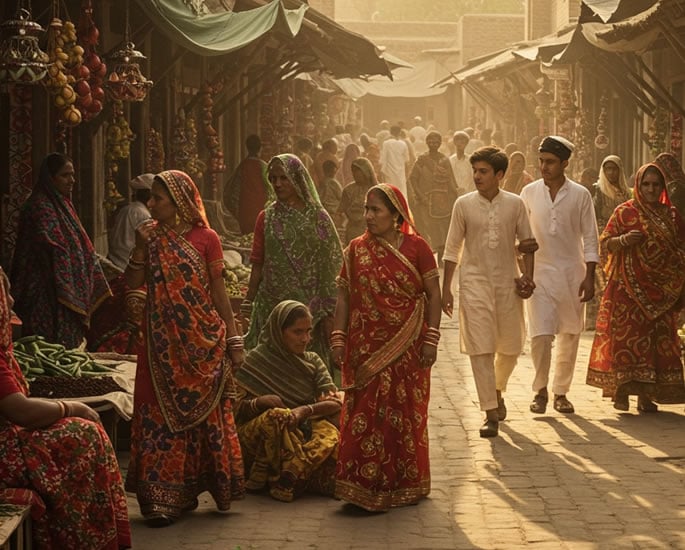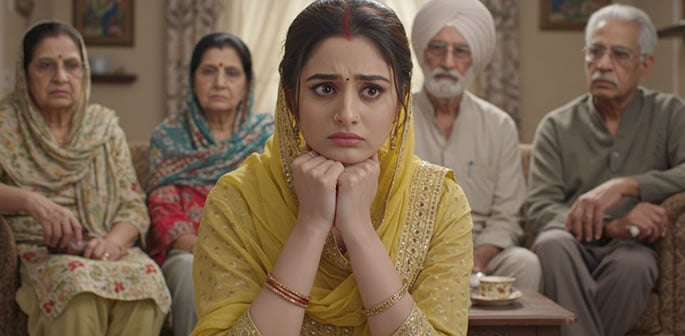Going against this may lead to being labelled selfish.
In South Asian communities, the phrase “log kya kahenge”, or “What will people say?” is not just idle curiosity. It quietly forces people to conform.
Beneath the soft tone is a tool that silences individuality to protect collective honour.
It functions as a form of persistent social surveillance. The fear it invokes dictates everyday choices, from what one wears, whom they love, how they speak, or the career they choose.
While South Asian communities feel its pressure, the burden falls heaviest on women and young people.
Instead of being an individual, they become obsessed with the approval of others.
The question “Who are you?” is subsequently overridden by “Who should you be?”
We explore how this mindset evolved, how it is enforced, and how some South Asians pay the price for keeping up appearances.
Historical & Cultural Roots

Log kya kahenge stretches far back into the honour-based, collectivist traditions of pre-colonial South Asia.
In tight-knit communities, individual desires were often overshadowed by familial and caste obligations.
Personal choices were public concerns, and one’s actions reflected not just on oneself but on an entire lineage.
Caste hierarchies reinforced this system. Honour was not equally distributed, as upper-caste families held themselves as the moral compass for entire communities.
Rules on marriage, clothing and gender roles were strict, and breaking them risked both personal and community reputation.
British colonial rule amplified these norms.
Victorian respectability focused on women being modest, quiet, and obedient. Schools, churches, and courts all helped keep these gender roles in place.
Indian psychologist Ashis Nandy argues that colonialism didn’t just conquer land but “colonised the mind”.
It formalised systems of class, gender, and caste control under the guise of civility.
This is where log kya kahenge shifted from an unspoken tradition to a moral yardstick. The fear of shame became so internalised that even post-Partition societies continued to uphold colonial notions of respectability.
Today, what is considered “decent”, “respectable”, or “proper” is often still filtered through the lens of colonial-era morality.
This mindset continues to be preserved through a combination of caste privilege, patriarchal family
systems, and social stratification.
As a result, some South Asians care more about what others think rather than what they feel is right.
Who Enforces It?

Log kya kahenge is typically enforced through a network: family, community, institutions, media and often, ourselves.
Within families, control is framed as care.
Children are told that choices must consider the family name. A daughter wanting a career in the arts may be discouraged “for her own good”. A son wanting to marry outside the community is reminded of ancestral shame.
Going against this may lead to being labelled selfish.
The media plays a powerful role. In countless South Asian films and dramas, protagonists who rebel against tradition are punished through isolation, disgrace, or even death.
Consider Bollywood’s frequent trope of the rebellious daughter being “tamed” by a patriarch, or the loyal son earning redemption through self-sacrifice.
These narratives glorify submission and depict individualism as arrogance.
In the diaspora, log kya kahenge is a factor within digital spaces.
WhatsApp groups become informal courts of public opinion. A photo of a woman in Western clothes posted online might be screenshotted and forwarded to a relative in Delhi, Lahore, or Dhaka, prompting unsolicited moral lectures.
Social media and messaging apps have become tools of transnational surveillance, which can have a bigger influence on a person’s subsequent desire for public approval.
This is due to this system’s reach.
Shame spreads not only from elders but also between peers. Cousins judge, friends enforce norms, and the real threat is often disappointment, exclusion, and rumours that linger.
The Effect It Has

The psychological toll of “log kya kahenge” is immense.
The constant fear of judgment reshapes how individuals see themselves and their place in the world. What begins as external pressure slowly becomes internalised shame.
Sahaj Kaur Kohli, the founder of Brown Girl Therapy, reflects on the emotional complexity faced by South Asians:
“When I went to therapy for the first time, I had no idea what to expect… I was raised with values opposed to those in the American environment.”
Queer individuals, creatives, and those who don’t conform to traditional roles are often hardest hit by “log kya kahenge”.
Many South Asians feel therapy isn’t designed for them; they fear it invalidates their cultural context.
As Sahaj added:
“Stigma stems from a feeling of something not being for us.”
Research also shows South Asians often avoid mental health services due to cultural mistrust and a lack of culturally sensitive care.
For some, the burden results in clinical anxiety or depression. For others, it leads to burnout, the quiet fatigue of living a life curated for others.
However, resistance is growing. Young South Asians are increasingly turning to therapy, online communities, and activism to reclaim their identities.
Artists and writers are using film, music, and spoken word to challenge inherited shame.
Campaigns like #UnlearnDesiCulture and collectives like Gaysi Family or the Pink Ladoo Project have become spaces for cultural redefinition.
But resistance comes with risks, as families may see this as betrayal. As a result, individuals may face backlash, ostracisation, and emotional isolation.
Moving Forward

Challenging “log kya kahenge” is not an attack on South Asian culture; it is an invitation to rethink it.
Respect for tradition and love for community can, and must, coexist with individuality and well-being.
The first step is recognising that shame is not the same as honour. In many South Asian households, these two ideas have been wrongly intertwined for generations.
Honour, in its truest form, is rooted in integrity, compassion, and fairness, qualities that strengthen a person’s dignity and a community’s cohesion.
Shame, on the other hand, is a tool of control. It thrives on fear and silence, ensuring that people comply not because they believe in the rules, but because they are afraid of the consequences of breaking them.
When families confuse shame with honour, self-expression becomes rebellion, and healthy individuality is mistaken for selfishness.
This mistake teaches people to value appearances over authenticity.
A woman staying in an unhappy marriage to “save face”, or a student abandoning their passion to choose a ‘respectable’ career, are not acts of honour; they are acts of survival under coercion.
Structural changes are necessary to improve mental health outcomes.
Culturally competent mental health services need to be accessible and free from stigma.
Educational curricula should incorporate diverse narratives that reflect South Asian histories beyond themes of obedience and sacrifice.
Family workshops, media literacy programmes, and community forums serve to bridge generational differences.
Open dialogue should be encouraged as a standard practice.
Children benefit from being taught to ask questions respectfully, while parents are encouraged to listen without defensiveness. Vulnerability ought to be recognised as a strength rather than a weakness.
Various grassroots initiatives are currently addressing stigma and contributing to the reshaping of mental health perspectives within South Asian communities.
For instance, SouthAsianTherapists.org offers a global directory of culturally sensitive counsellors, enabling individuals to find therapists who understand their cultural context.
Meanwhile, The Desi Condition podcast, created by Tanushree Sen, delves into emotional wellness through the lens of South Asian history, sociology, and personal stories, offering a much-needed space for reflection and healing.
And critically, men must be part of this change. Patriarchy is upheld not only by those who enforce it, but by those who remain silent.
Fathers, uncles and brothers must begin to speak, to support, to unlearn this regressive mindset.
As Ashis Nandy adds:
“To deny people the right to their own contradictions is to colonise their souls.”
South Asians must be allowed to make their own choices without fear of family group chats or neighbours’ whispers.
Dismantling “log kya kahenge” is not rebellion. It is a necessary cultural evolution. If tradition is to survive, it must be flexible enough to grow with its people, not weigh them down.
The phrase log kya kahenge has long been a way to keep people in line through fear of shame and what others might think.
It’s stuck around because silence and pressure have a strong hold, shaping choices about marriage, careers, and identity, often pushing people to fit in rather than be themselves.
But cultures aren’t set in stone. New voices are speaking up, in homes, schools, and online, bringing fresh conversations about understanding and acceptance.
This shift shows that connection can take the place of control, and empathy can outlast judgment.
Now, the question is less about “What will people say?” and more about “Who do we want to be?”
Over time, those whispers of judgment will fade, and what will stay are the voices brave enough to speak out, clearly and without apology.






























































